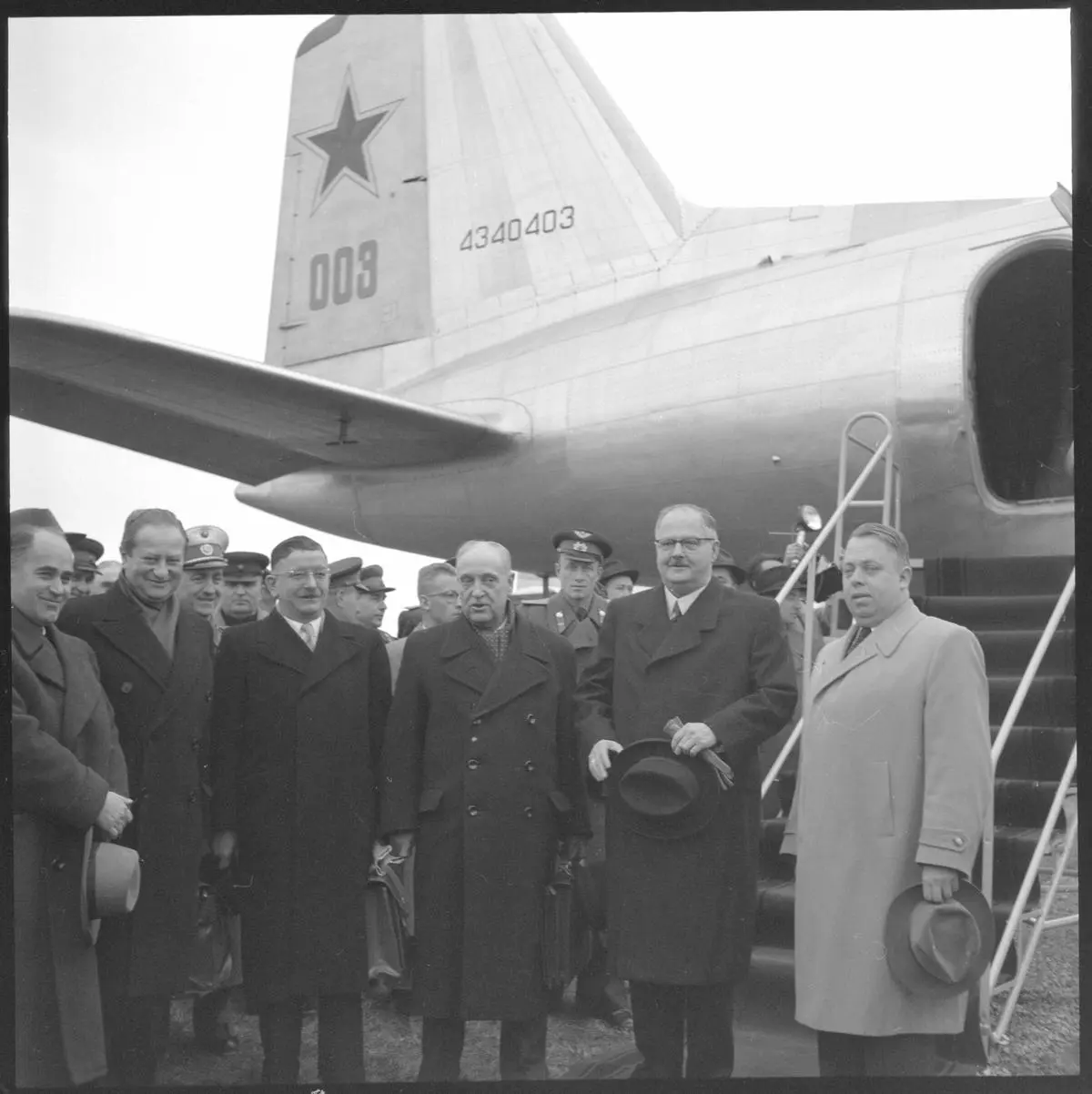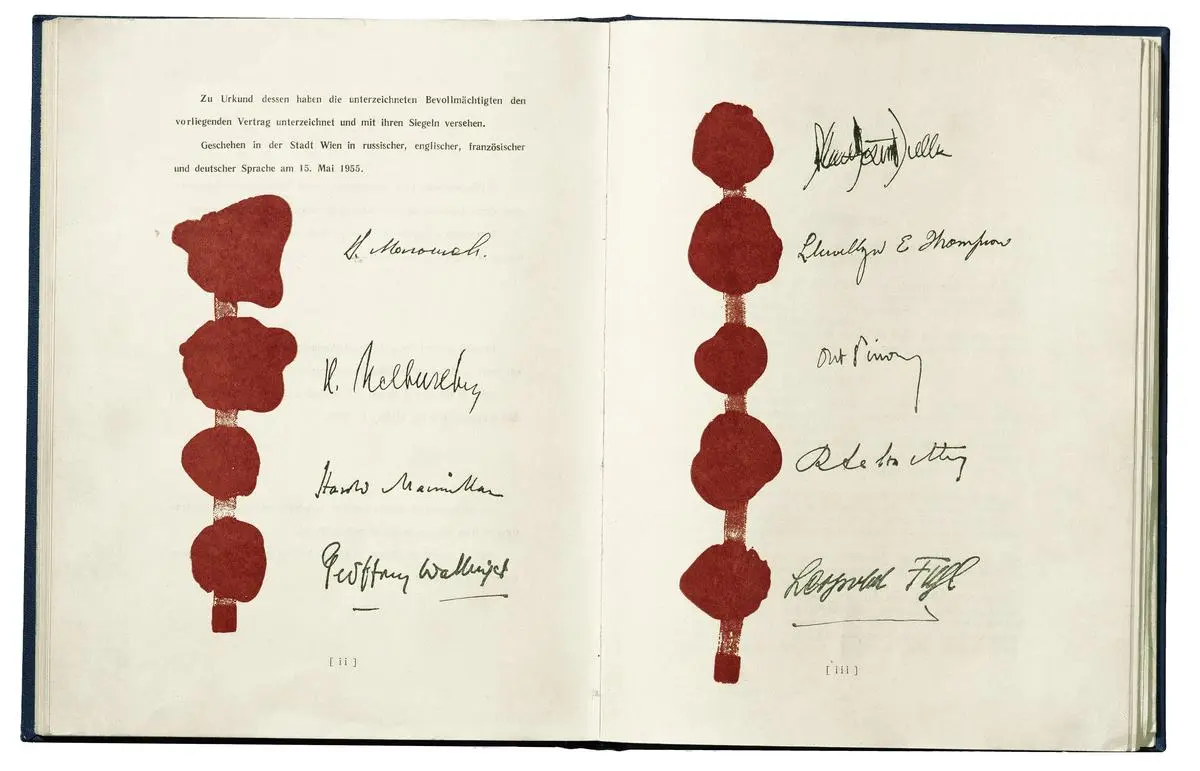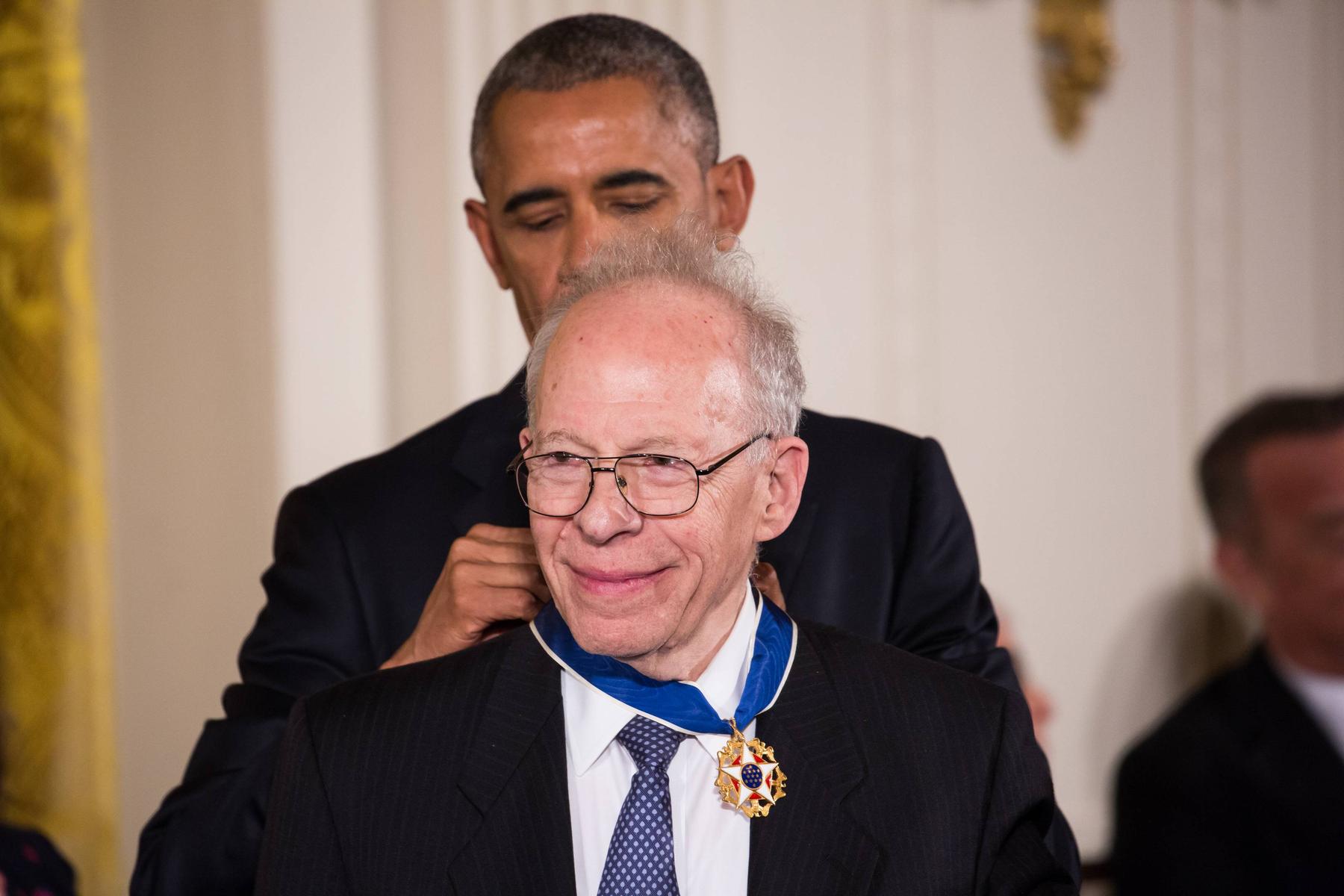How Austria fought for the state contract – Diepresse.com

What was crucial for the breakthrough, which led to the acclaimed May 15, 1955? Negotiation skills, the geopolitical situation and also a portion of luck. Over the dramatic days before.
The dry facts in the history books are often not enough to create national identity. Then myth formation helps. The best -known cartoon for the Austrian state contract was created in 1955. The caption of draftsman Hanns Erich Köhler in the « Simplicissimus » shaped the picture of the successful negotiations of the Austrian delegation in Moscow: « And now Raab – now D ‘Reblaus, then sans Waach! » Foreign Minister Leopold Figl, who played the zither, playing Heurigenmusican Julius Raab, full -time Chancellor in Austria, whispers this sentence in the ear. On the other side of the table, the Soviet Foreign Minister Molotow is already dissolved in tears.
No protocol, no diary entry, no personal memory such an episode. The reality was extremely complex. Together with remarkable diplomatic skills of the Austrians, with their endurance and ingenuity when finding away from away from processed situations, the new geopolitical situation played a role. After Stalin’s death in 1953, she benefited the occupied country on the border between east and west. The new party leader Nikita Khrushchev wanted to end the standstill and loosen from Stalin’s shadow: « Why do we sit in Austria, what are we waiting for? » In 1955, for Austria, an “Annus Mirabilis” (Gerald Stourzh), which led to the withdrawal of the Allied occupying powers, led out of the country and gave him freedom. After ten years that seemed endless to the Austrians.
The Moscow trip brought the breakthrough
The breakthrough succeeded on April 13, 1955. That was the second day of the trial in Moscow. Two days earlier, the Austrian government delegation left the Soviet military airport in Bad Vöslau. In addition to Raab and Figl, Adolf Schärf and Bruno Kreisky and a small number of officials were there. The fact that Raab and Figl belonged to the ÖVP and Schärf and Kreisky of the SPÖ should not be particularly emphasized here: they did not act as party politicians, but as an Austrian. The reception in Moscow was friendly, almost overwhelming, with a sightseeing program, opera visit and a banquet in the Kremlin with Khrushchev. Skepticism almost occurred: so much fanam. Austria wanted a negotiation result, nothing more and nothing less.
« /> The Austrian delegation before departure to Moscow (from left: Kreisky, Figl, Schärf and Raab). Cermak, Alfred/ÖNB-Bildarchiv/pictureDesk.com
The speech by the Soviet head of government Nikolai Bulganin was calming: the Austrian question should finally be solved. The German and Austrian problem were wanted to treat in Moscow, said Bulganin. « Unpleasant », but a fact has been a fact that Germany became a member of NATO since October 1954. So the coupling of these two questions was off the table. Now it was Moscow’s interest in preventing Austria’s accession to a military pact, the country should not become a « marching area for other powers ».
This addressed the main topic: neutrality. The model of Switzerland was immediately discussed. Obviously, the Soviets found the idea of the idea that they themselves referred to them and suggested a voluntary, no forced declaration of neutrality in the form of a solemn declaration. It was a « masterpiece of diplomatic argument » that Molotow offered here, « Austria, the Western Powers and the Soviet Union – created the political prerequisite for the conclusion of the state contract and the deduction of the foreign powers from Austria » (so Gerald Stourzh and Wolfgang Mueller in their standard work « The Battle for the State Treaty »).
This way out of the situation was not new. Only he had come across skepticism, inner Austria and internationally. Until the end, the Western Allies feared a neutralization of Germany, which was no longer possible with the NATO accession. For Julius Raab, neutrality was even a magic word that would lead to a breakthrough. « I face everything to receive the state contract », he is said to have said. If the Russians shake your hand, you shouldn’t miss this chance. Schärf and Kreisky proved to be flexible in the question. Austria’s state -supporting parties could not allow themselves to do anything on this topic. It was too much.
With the replacement of the Austrian oil deposits and the DDSG, both in Soviet possessions, Austria met with a generous offer, and the banter to the date of the crew soldiers offered little conflict. Here the Russians gave up, they agreed to a three -month period. A compromise package was laced on April 13. Characteristic of the good atmosphere was Anastas Mikojan’s sentence: « You will forget that we were an occupation power and we want to forget that Austria fought against the USSR. »
« The neutrality was the condition »
Until the morning hours of April 15, it was then filed on a memorandum. The time at which Austria undertook to decide on a neutrality law, immediately after signing the state contract or after the troops were deducted, briefly caused difficulties. But it was agreed: only a sovereign state could decide such a law, out of the free decision and by a chosen parliament.
What followed was a fraternization banquet with numerous drinking sayings, as has never taken place in the Kremlin with a western, anti -communist country. The reduction of the mutual distrust was apparently the key to success. The Soviet side even regretted that their state had lost reputation among the Austrians through the ten -year -old occupation. It has become clear to everyone that this did not think anything of socialism.
The memorandum was signed without neutrality being mentioned here, and on April 15 at noon the Austrians returned to Vienna in the triumphal procession. The Austrian population has already been informed: « Austria is becoming free. We get our home floor back in its entirety, » was the message. There was no question of neutrality yet, it was agreed in confidentiality to prepare the Austrian public.
»The next morning we signed in the following order: Raab, Schärf, Figl, Kreisky. Everything was very solemn, despite the full daylight. (…) We flew home at noon. There we were received with tremendous cheers. Thousands lined the streets from Bad Vöslau Airport to Vienna. This April 15, 1955 was the greatest day of my political life. Never again, it seemed to me, I would experience something similar. And so it has remained to this day. »
Bruno Kreisky about the Moscow Memorandum
The announcement that the Russians now also left the last prisoners of war home provided joy in the Austrian population. The entire government and both party president were behind the team that had negotiated in Moscow. « The neutrality was the condition, » said Julius Raab in the talks. The western powers generally agreed, nobody wanted to take responsibility for perpetuation of the crew state if the Russians were decided to retreat. Between 2nd and 13th May 1955, an ambassador conference took place in Vienna on the subject. Within three months, but at the latest by the end of the year, the last Allied soldier should have left the country. The western representatives did not enthusiastic about Austria’s neutrality status. But Austria calmed down: You could very well defend yourself.
Solemn signing in the Belvedere
On May 14th, all Foreign Minister in Vienna, the chair of the conference was chaired by Molotow. At the very last moment, Leopold Figl managed to declare a paragraph from the preamble to the state contract. It was the part in which Austria’s « responsibility » was mentioned to participate in Hitler’s war. One later spoke of a « pyrrhous victory » and a « morally non -durable » deed that disabled the moral reflection on the role of Austria as an accomplice. A counter argument: Who, if not the former concentration camp prisoner Figl, had the right to ask for this from a former Hitler ally like Molotow?
This prevailed between all four powers and Austria over the entire text of the state contract. The signing on May 15 and Figl’s appearance on the balcony of the castle in front of the cheering crowd was only a matter of form. « If the bells from all over Austria, from Lake Constance to the Neusiedlersee, from Thaya to the Karawanken, ring, then they ring in a new time for Austria, then they announced that Austria is free. » Figls Pathos was more than justified at that moment.

« /> Document of independence. Seal and signatures on the state contract. Austrian Archives / Brandstaetter Images / Picturedesk.com
Published

The second republic. Austria from 1945,
Volume 24 of the « Press » story series, written by Günther Haller:
106 pages, 14.99 euros
(Club advantage: 12.99 euros).
Available under
shop.diepresse.com







